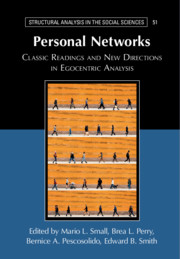Book contents
- Personal Networks
- Structural Analysis in the Social Sciences
- Personal Networks
- Copyright page
- Contents
- Figures
- Tables
- Contributors
- I Background
- II Early Foundations
- III Later Foundations
- IV New Perspectives
- 20 On Cognition
- 21 On Mobilization
- 22 On Trust
- 23 On Dynamics
- 24 On Inequality
- 25 On Culture
- 26 On Migration
- 27 On Movements
- 28 On Social Media
- Index
- Recent Books in the Series
- References
20 - On Cognition
Network Representation Capacity: How Social Relationships are Represented in the Human Mind
from IV - New Perspectives
Published online by Cambridge University Press: 01 October 2021
- Personal Networks
- Structural Analysis in the Social Sciences
- Personal Networks
- Copyright page
- Contents
- Figures
- Tables
- Contributors
- I Background
- II Early Foundations
- III Later Foundations
- IV New Perspectives
- 20 On Cognition
- 21 On Mobilization
- 22 On Trust
- 23 On Dynamics
- 24 On Inequality
- 25 On Culture
- 26 On Migration
- 27 On Movements
- 28 On Social Media
- Index
- Recent Books in the Series
- References
Summary
This chapter seeks to resolve the puzzle of people’s low accuracy in perceptions of local network properties versus their much higher accuracy in perceiving global network structures. We argue that this puzzle is more apparent than real because humans rely on layers of relational schemata—mental structures dictating how social agents ought to be structurally connected—to mentally organize their social contacts. In other words, differences in accuracy reflect differences in the schemata used by the individual to mentally represent social network information at varying levels (e.g., dyadic level, triadic level, and community level). Individuals vary in their schemata repertoire, and their tendencies to adopt certain schemata in a given situation or context, so the specific set of schemata that individuals activate varies in its sufficiency and appropriateness for fully representing the network structure. We define these individual differences as network representation capacities, and review and compare four prominent approaches to quantifying them: the error paradigm, the free-recall paradigm, the structural learning paradigm and the statistical learning paradigm. We conclude by inviting researchers to reconsider the relations between cognition and egocentric networks, as well as the role of network analysis in analyzing, describing and prescribing social relational behavior.
Keywords
- Type
- Chapter
- Information
- Personal NetworksClassic Readings and New Directions in Egocentric Analysis, pp. 555 - 572Publisher: Cambridge University PressPrint publication year: 2021
References
- 1
- Cited by

